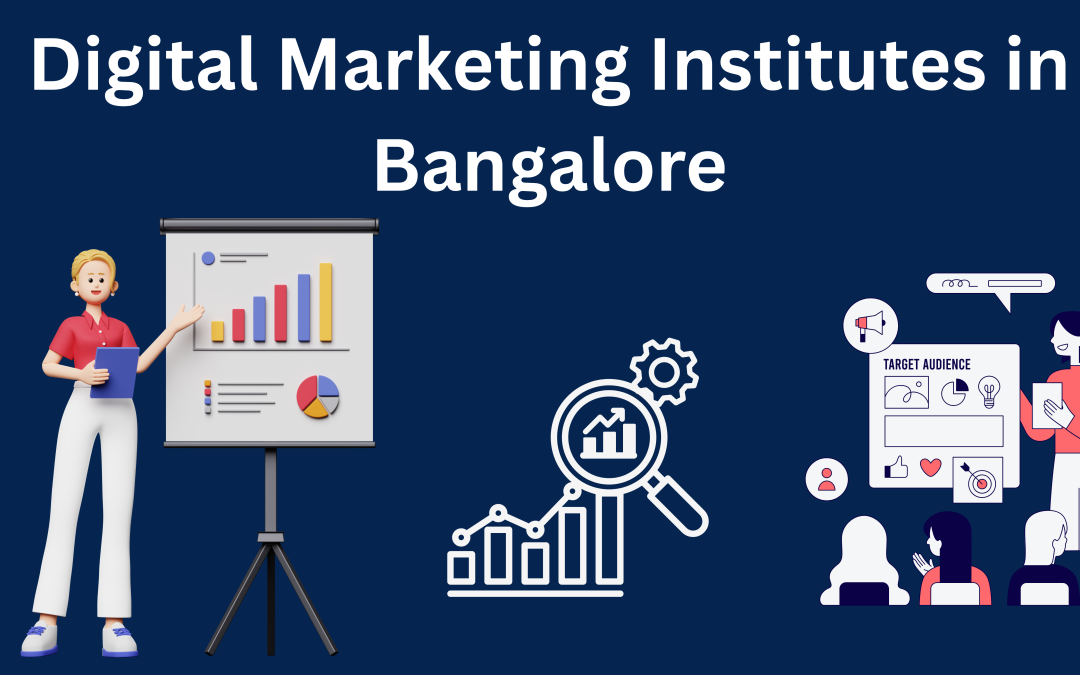
by Shashikanth Heerekar | Jun 25, 2025 | All Things about Marketing
Learn about Oxygen and Kandradigital, Bangalore Digital Marketing, eMarket Education, Web Marketing Academy, and Bangalore’s top ten digital marketing institutes. Learn about their expert training programs in SEO, social media, UI/UX, and content marketing to boost your digital skills and career.
Introduction
Bangalore, India’s tech capital, is also emerging as a digital marketing education and skill development hub. Whether you’re a student aiming to break into the digital industry or a professional seeking to upgrade your skills, the city offers top-tier digital marketing institutes.
These training centers provide hands-on experience in SEO, social media marketing, PPC, content marketing, and more, helping individuals and businesses stay ahead in the evolving digital landscape.
Here are the top 10 digital marketing institutes in Bangalore, with a special mention of Oxygen, a seasoned industry leader from Hyderabad making a strong impact across India.
Oxygen
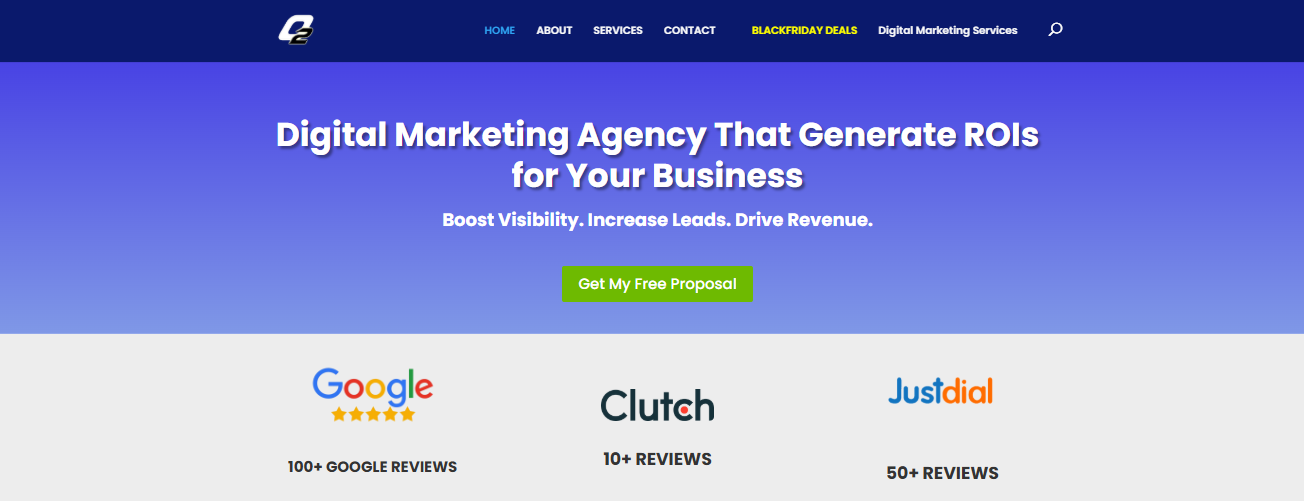
Oxygenites
Though headquartered in Hyderabad, Oxygen has earned a nationwide reputation for excellence in digital marketing education and services. With over 13 years of industry experience, Oxygen offers a robust curriculum for beginners, entrepreneurs, and working professionals.
Oxygen’s practical, real-world training sets it apart. It covers SEO, social media marketing, content creation, paid advertising, and digital analytics. The company’s trainers are industry experts who combine academic knowledge with real-world project exposure.
Contact Details
Kandradigital
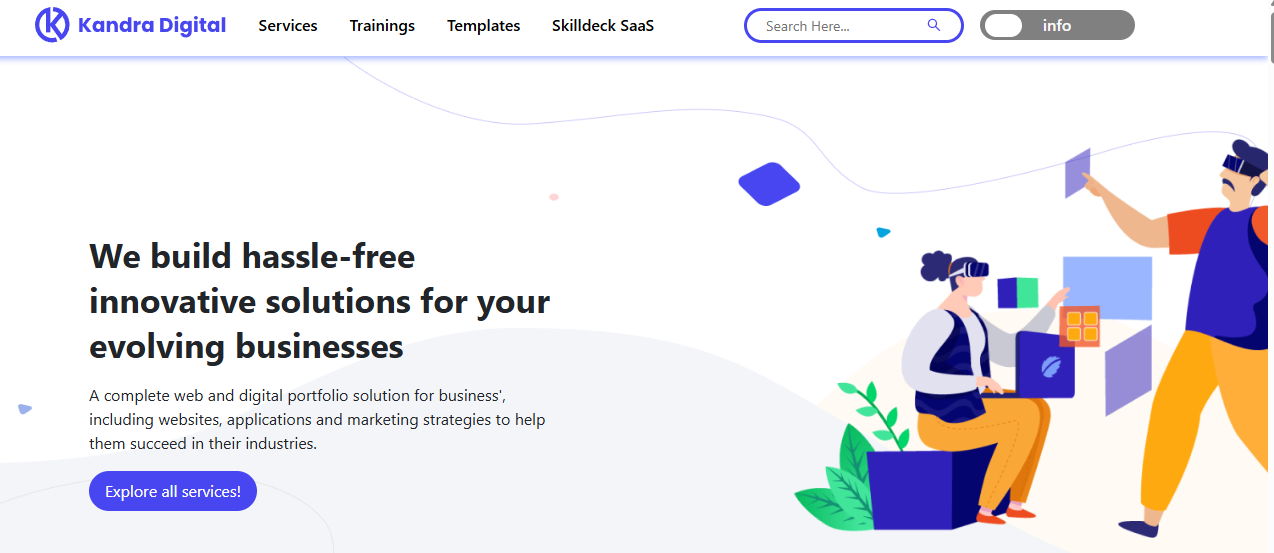
KandraDigital
KandraDigital is a Bangalore-based digital marketing training institute known for delivering premium, agency-style learning experiences tailored for graduates, working professionals, entrepreneurs, and corporate teams. What sets KandraDigital apart is its focus on hands-on, real-time, project-based learning, backed by live case studies and personalized guidance—preparing learners to meet real-world industry challenges from day one.
Recognized as one of the best digital marketing institutes in Bangalore, KandraDigital offers job-oriented training programs that include one-on-one mentorship, corporate upskilling modules, and interactive classroom sessions. The institute delivers a comprehensive suite of digital marketing courses, including
SEO (Search Engine Optimization)
Performance Marketing (Google Ads, Meta Ads, and more)
Social Media Marketing
Content Marketing
HubSpot Marketing Automation
E-commerce Marketing
Analytics & Reporting
Influencer Marketing
Email Marketing and CRM Tools
Affiliate & Programmatic Advertising
At the core of KandraDigital’s reputation is Manjunath Chowdary, a seasoned digital marketing expert with over 15 years of experience working with India’s top-tier brands such as Redbus, BigBasket, Mobikwik, Dailyhunt, UpGrad, and several global companies. Prominent for his lucidity, profound knowledge of the subject, and ability to teach in multiple languages (English, Telugu, Kannada, and Hindi), Manjunath guarantees that all students, regardless of their background, acquire a solid practical foundation and abilities that are ready for the workplace.
What makes KandraDigital unique is its dual role as both a functioning digital agency and a training hub, enabling learners to work on real-time projects under expert supervision. In addition to training, the company provides services in web development, mobile app development, and 360° digital marketing, offering students unmatched exposure to live tools, strategies, and campaigns.
Established in 2018, KandraDigital has built a strong global presence, with learners enrolling from across India and internationally through its live virtual training programs.
Whether you’re looking to launch a career in digital marketing, upskill your current role, or train your team with real-world strategies, KandraDigital offers the expertise, infrastructure, and credibility to help you succeed.
Contact Details
Web Marketing Academy
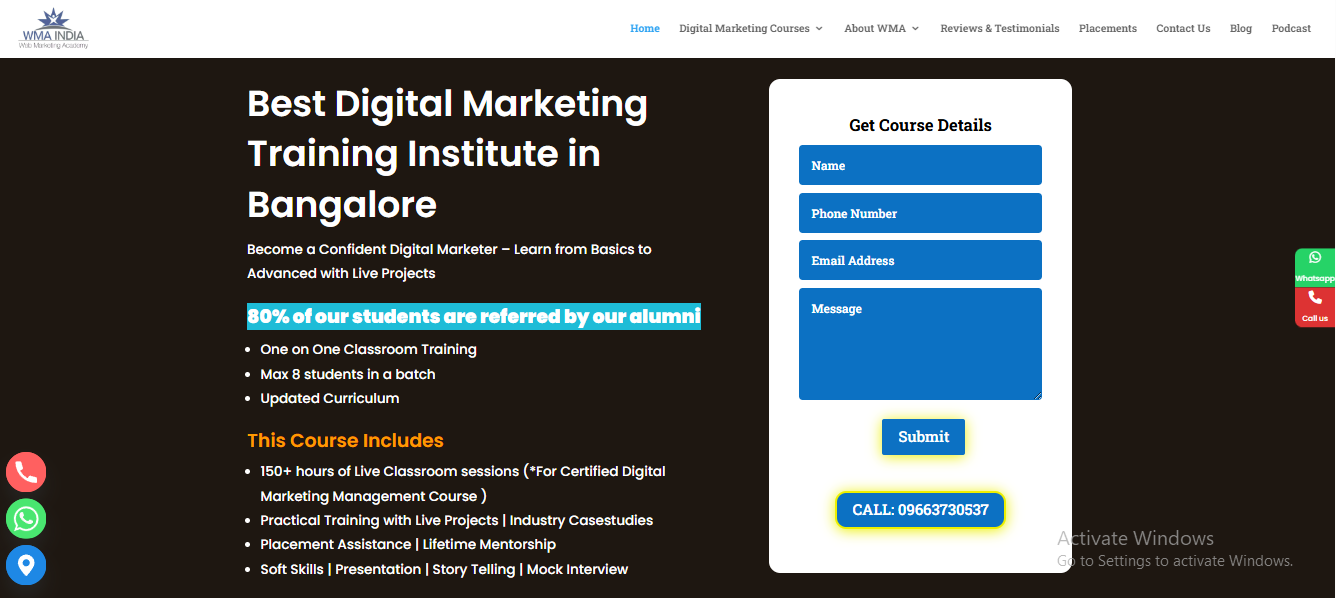
Web marketing
Web Marketing Academy (WMA) is a leading digital marketing institute in Indiranagar, Bangalore. Known for its hands-on, classroom-based training, WMA offers a comprehensive 3–4 month digital marketing certificate course. Designed for students, professionals, entrepreneurs, and freelancers, the program focuses on practical application and in-depth learning.
The course curriculum covers over 40+ modules, including website creation with WordPress, SEO (on-page, off-page, local), Google Ads (Search, Display, Shopping), social media marketing (Facebook, Instagram, LinkedIn), content creation with AI tools, email marketing, blogging, YouTube video marketing, affiliate marketing, remarketing, Google Analytics, and influencer marketing. Students also receive training on resume writing, portfolio building, and mock interviews to help with job placements or starting a freelance career.
What Makes WMA Unique:
- Small class sizes for personalized attention (max. 8-10 Students per batch)
- Real-world projects using industry tools and platforms (Live projects for each module to get a Hands-on learning experience)
- Up-to-date curriculum taught by experienced professionals (updated 2025)
- Lifetime mentorship and placement support (Job-oriented certification course)
- Proven track record with students placed in startups and top companies like Google, Facebook, TCS, Cognizant, Yahoo, Decathlon, etc.
Web Marketing Academy combines deep learning with real-world exposure, ensuring students gain the knowledge and confidence to succeed in the digital marketing industry.
Contact Details
Inventateq
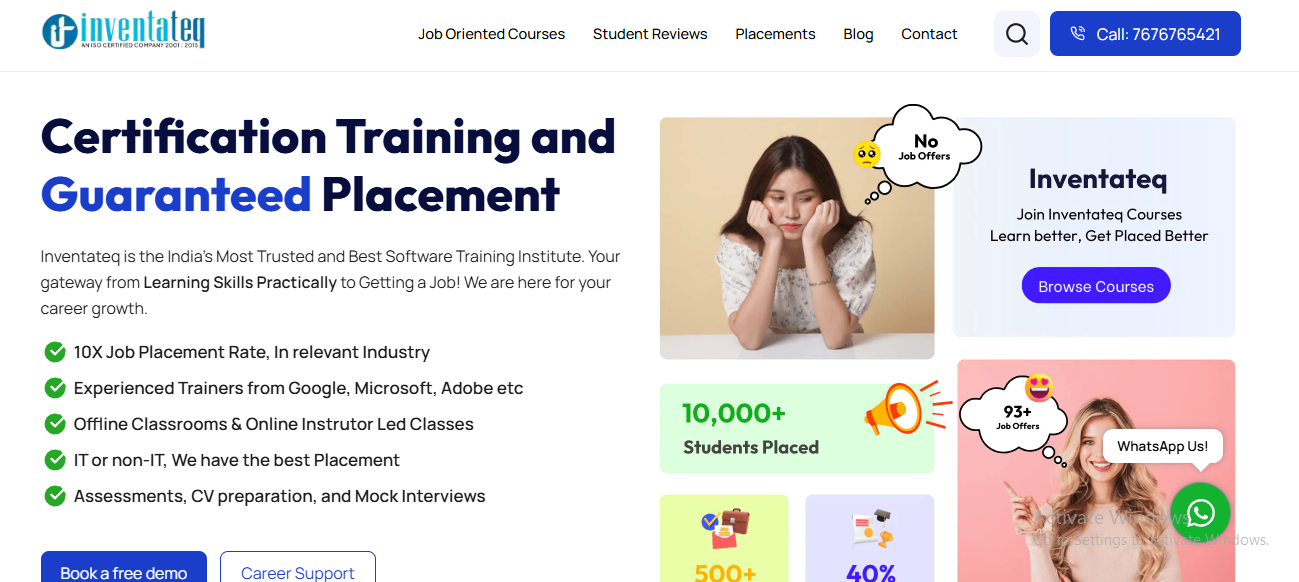
INVENTAEQ
Inventateq is a well-established digital marketing training institute in Bangalore, recognized for offering comprehensive, career-oriented courses in digital marketing and web solutions.
Their course offerings include SEO, PPC (pay-per-click), link building, social media marketing, and online reputation management, equipping students with a broad skill set in demand in today’s job market.
Inventateq also provides access to offshore hiring resources, such as SEO specialists and social media marketers, reflecting their strong industry network and practical orientation.
Additionally, learners benefit from training in web design, logo creation, and web development, making it an excellent choice for those who want both marketing and design expertise. With an emphasis on live projects, placement support, and real-world application, Inventateq continues to be a preferred digital marketing institute in Bangalore.
courses offered
Seo
Pay-per-click (PPC)
Link Building
Social Media Marketing
Online Reputation Management
Web Design
Web Development
Logo Design
Contact Details
BDM
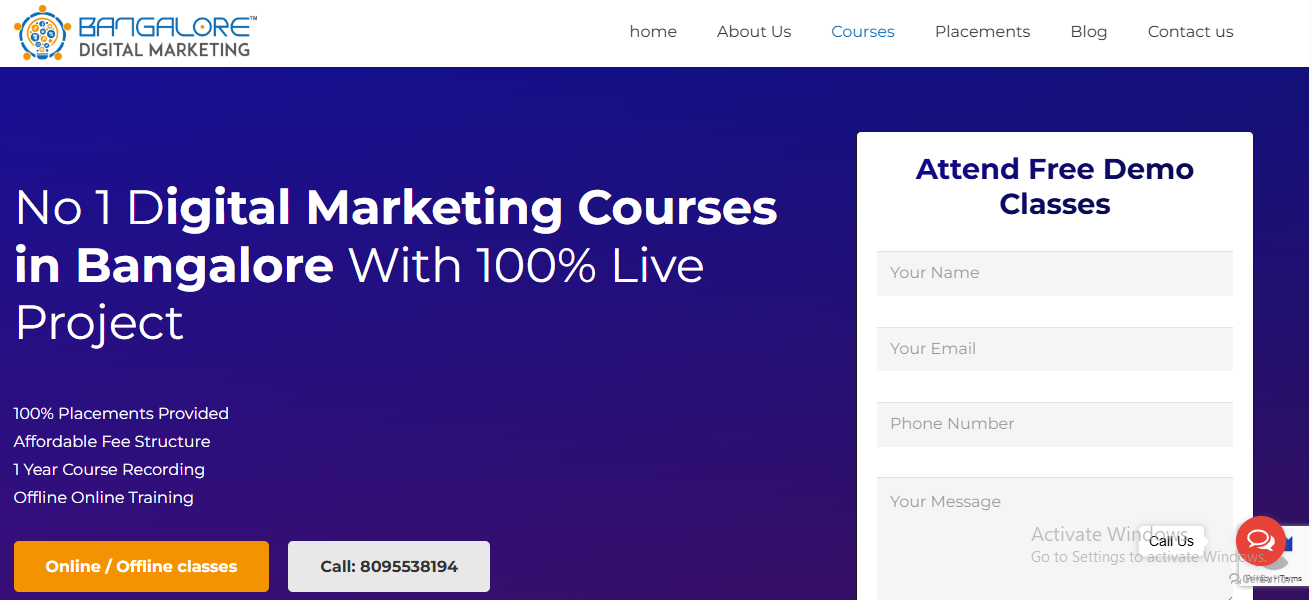
BDM
BDM is a prominent institute known for delivering comprehensive, hands-on training in key areas of the digital marketing ecosystem.
The institute offers specialized courses in digital marketing, UI/UX design, SEO, PPC training, and graphic design, catering to beginners and professionals looking to strengthen their skills.
Students benefit from practical learning modules, live project exposure, and expert mentorship that bridge the gap between academic knowledge and industry requirements.
Additionally, their social media marketing and video editing courses make them a well-rounded choice for aspiring content creators and performance marketers. With a strong emphasis on creative and technical skills, Bangalore Digital Marketing is considered one of the top digital marketing training institutes in Bangalore.
courses offered
Digital Marketing
UI/UX
SEO
graphic design
PPC training
Social media marketing
video editing
Contact Details
iDigital Academy

IDIGITAL ACADEMY
iDigital Academy is a Trusted training center in Bangalore that provides career-focused courses in graphic design and digital marketing. Renowned for its hands-on approach and knowledgeable instructors, the academy gives students exposure to real-world projects and imparts in-demand skills that are in line with current business trends.
Their Advanced digital marketing course with AI is designed to cover SEO, social media marketing, Google Ads, and content strategies, ensuring students gain the confidence and knowledge to handle real business challenges with their Agency Based Training and Internship Oppurtunities.
With flexible schedules, interactive classes, and dedicated placement support, iDigital Academy has become a go-to choice for aspiring digital professionals looking to build a strong foundation and advance their careers. They offer Classroom, Online and Corporate Training.
courses offered
Digital marketing course
Graphic Design course
Contact Details
EMarket Education
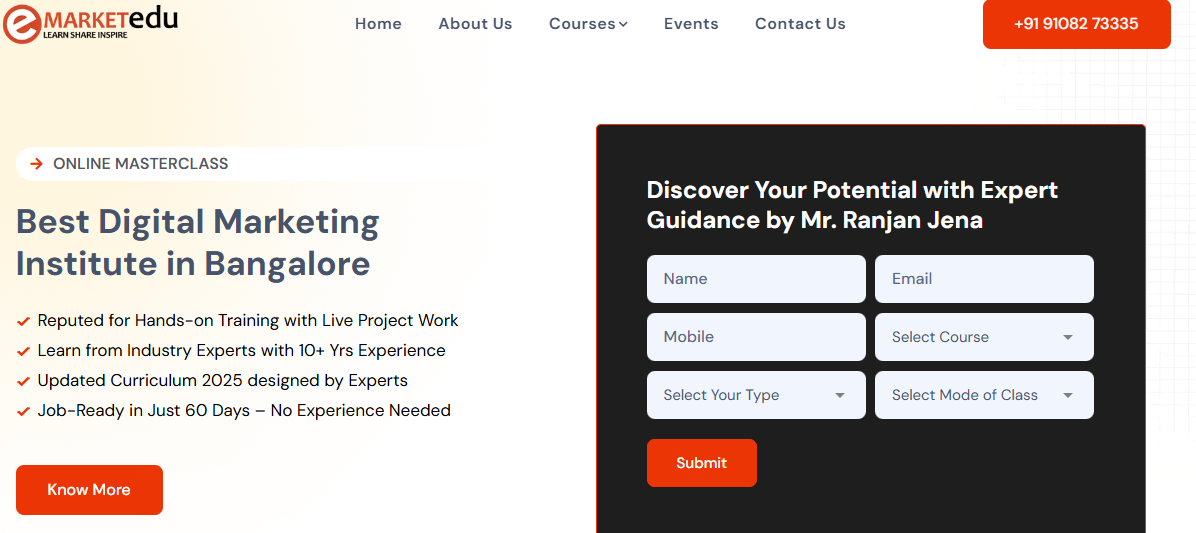
Emarketing Education
eMarket Education is one of Bangalore’s most reputed institutes. It offers specialized training in digital marketing with a strong focus on practical knowledge and career-oriented skills.
With a curriculum designed by industry professionals, the institute equips students with the essential tools and techniques to succeed in today’s competitive digital world.
Their digital marketing course covers SEO, Google Ads, social media marketing, analytics, and more, ensuring students gain real-time project experience and industry certification.
Known for its personalized mentoring, small batch sizes, and placement support, eMarket Education is a top choice for those seeking quality digital marketing training with real-world applications in Bangalore.
courses offered
Digital marketing course
PPC Google ads course
Social media marketing
SEO
Soft skills and interviews
Adobe analytics training
power BI training
Python Training
GTM training
Contact Details
Conclusion
Choosing the right digital marketing institute in Bangalore can be a transformative step in building a successful career in the digital space. Whether you’re a beginner looking to enter the field or a working professional aiming to upgrade your skills, Bangalore offers a variety of training programs that focus on practical knowledge, real-time projects, and industry-relevant tools.
These institutes provide comprehensive training in SEO, PPC, content marketing, social media marketing, UI/UX design, and more. With structured curriculums, expert trainers, and placement support, learners are equipped to meet the growing demand for skilled digital marketers across industries. Enrolling in a reliable and forward-thinking digital marketing course ensures you stay competitive in today’s fast-evolving digital economy.
FAQS
1. In digital marketing classes, what subjects are frequently covered?
A. A standard digital marketing course includes SEO, PPC, Google Ads, content marketing, social media marketing, email marketing, analytics, and sometimes UI/UX and video editing.
2. Can I learn digital marketing online from Bangalore institutes?
A. Many institutes offer flexible online training modules that include live classes, recorded sessions, and one-on-one mentoring, making it easy for remote learners to gain valuable skills.
3. What job role is available after completing a digital marketing course?
A. Graduates can pursue roles such as SEO specialist, social media manager, content marketer, PPC analyst, digital strategist, UI/UX associate, or marketing automation executive.
4. How long will it take to complete a digital marketing course?
A. The duration can range from 1 to 6 months depending on the depth of the course, delivery mode, and whether it includes internships or capstone projects.
5. In a course on digital marketing, what kinds of tools are usually taught?
A. Courses often include hands-on training in tools like Google Analytics, Google Ads, SEMrush, Ahrefs, Canva, Meta Business Suite, Mailchimp, and WordPress.
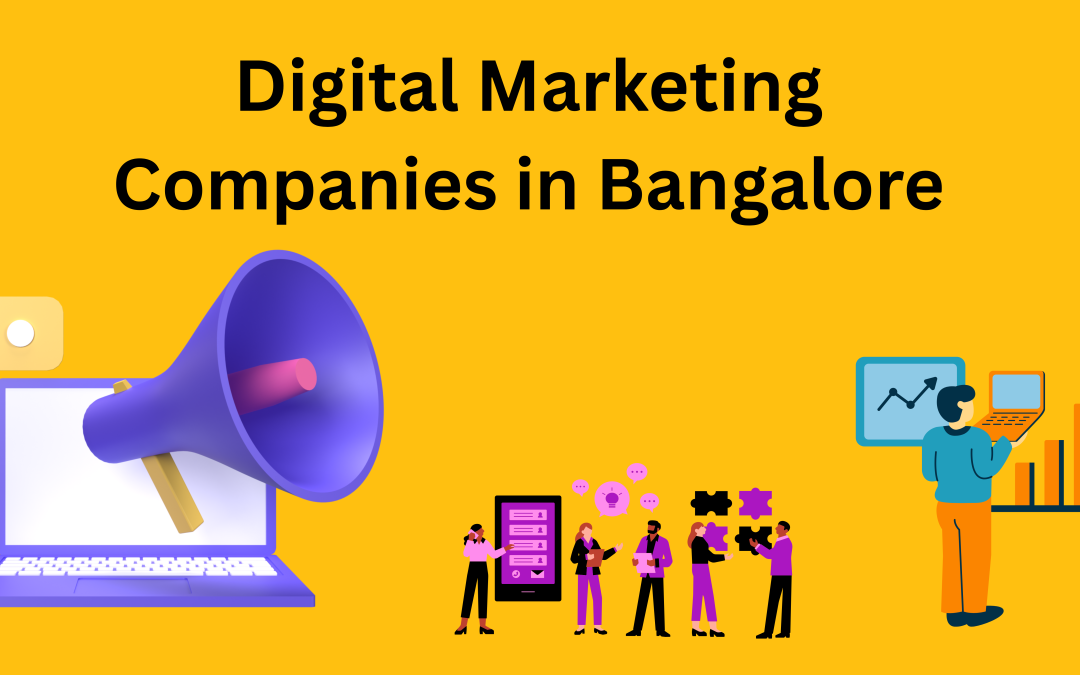
by Shashikanth Heerekar | Jun 16, 2025 | Digital Marketing
Discover the top 10 digital marketing companies in Bangalore, including Oxygen, Bleap Digital, Inbounderz, Honeycomb, Itzfizz, SkyRam Technologies, Beta Marketing, and more. Explore expert reviews, services offered, and why these agencies stand out digitally.
Introduction
Innovation, originality, and effective techniques are driving the digital marketing scene in Bangalore. Regardless of your brand’s age, selecting the correct digital marketing partner may improve your online visibility and produce quantifiable outcomes.
Bangalore, known as the Silicon Valley of India, is home to a thriving ecosystem of digital talent and creative agencies that cater to both local and global brands. From startups aiming to build their brand from scratch to established enterprises looking to optimize their digital ROI, these marketing companies provide customized strategies powered by data, creativity, and the latest technology.
Whether you’re seeking search engine optimization (SEO) to improve organic rankings, social media marketing to engage with your audience, or pay-per-click advertising for faster lead conversions, the digital marketing firms listed in this article offer comprehensive and result-oriented solutions. Their industry knowledge, innovative thinking, and customer-first approach make them leaders in shaping Bangalore’s digital future.
Here’s a curated list of the digital marketing companies in Bangalore making waves in the digital space. Leading the list is Oxygen, a Hyderabad-based company with a strong presence and legacy of trust.
Oxygen
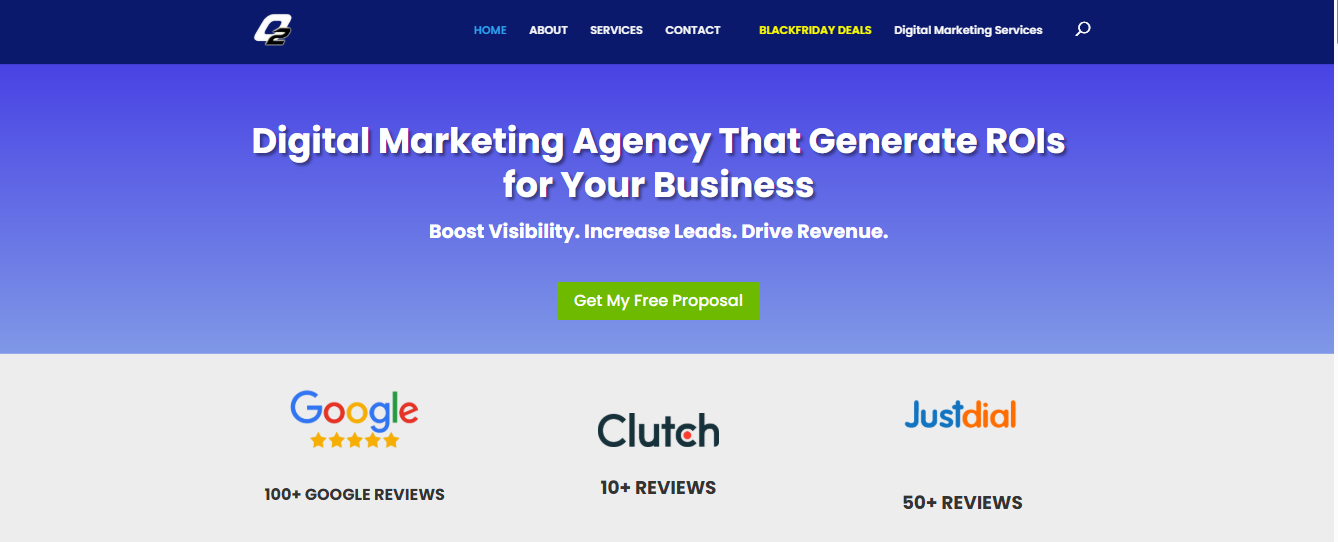
OXYGEN
A Trusted Digital Marketing Company in Hyderabad with 13 Years of Excellence Though based in Hyderabad, Oxygen has gained significant traction among businesses in Bangalore for its highly targeted digital marketing solutions. With 13 years of consistent service and excellence, Oxygen has built a solid reputation for offering top-notch services like SEO, Google Ads, social media marketing, content marketing, and more.
Clients consistently praise Oxygen for its transparent communication, results-driven approach, and customized strategies that align with unique business goals.
Oxygen’s commitment to continuous improvement and client satisfaction truly sets it apart. Its seasoned team of digital marketing experts is known for delivering measurable ROI and adapting to the latest trends and technologies. Many businesses in Bangalore prefer Oxygen for its ethical SEO practices, creative content campaigns, and unmatched support.
Contact Details
Itzfizz Digital
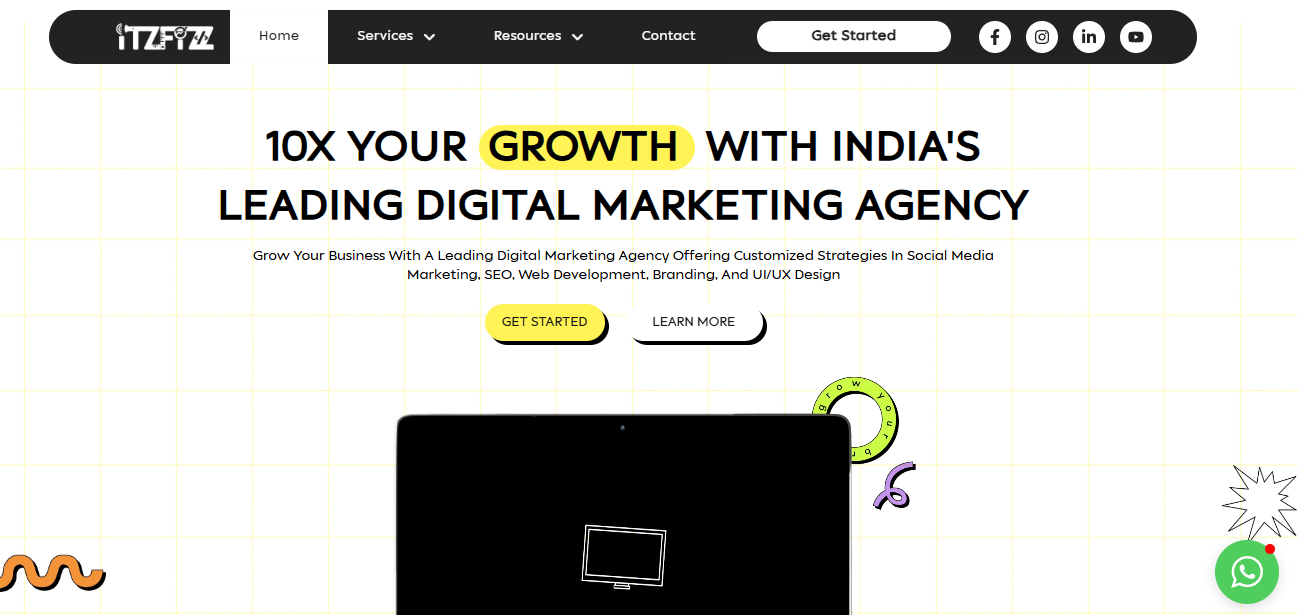
Itzfizz
Itzfizz Digital is a founder-led, growth-focused digital marketing agency based in Bangalore, established in 2020 by Sufaiyah and Noor. With a lean team and power partnerships, Itzfizz has delivered 200+ projects across India, the UAE, the UK, and the USA, serving brands like Tipplr, Loyora, Waterstone, Acenteus, Lama Design, HED Media, and more.
Specializing in UI/UX design, web development, SEO, branding, and social media marketing, the agency combines conversion-centric design with data-driven content and agile execution. Clients praise its transparent communication, flexible engagement models, and measurable ROI, which is reflected in a 4.0-star Trustpilot rating.
Whether you’re a startup seeking rapid growth or an established enterprise aiming to optimize digital performance, Itzfizz offers scalable, insight-led solutions tailored to your brand’s DNA.
Contact Details
BLeap Digital
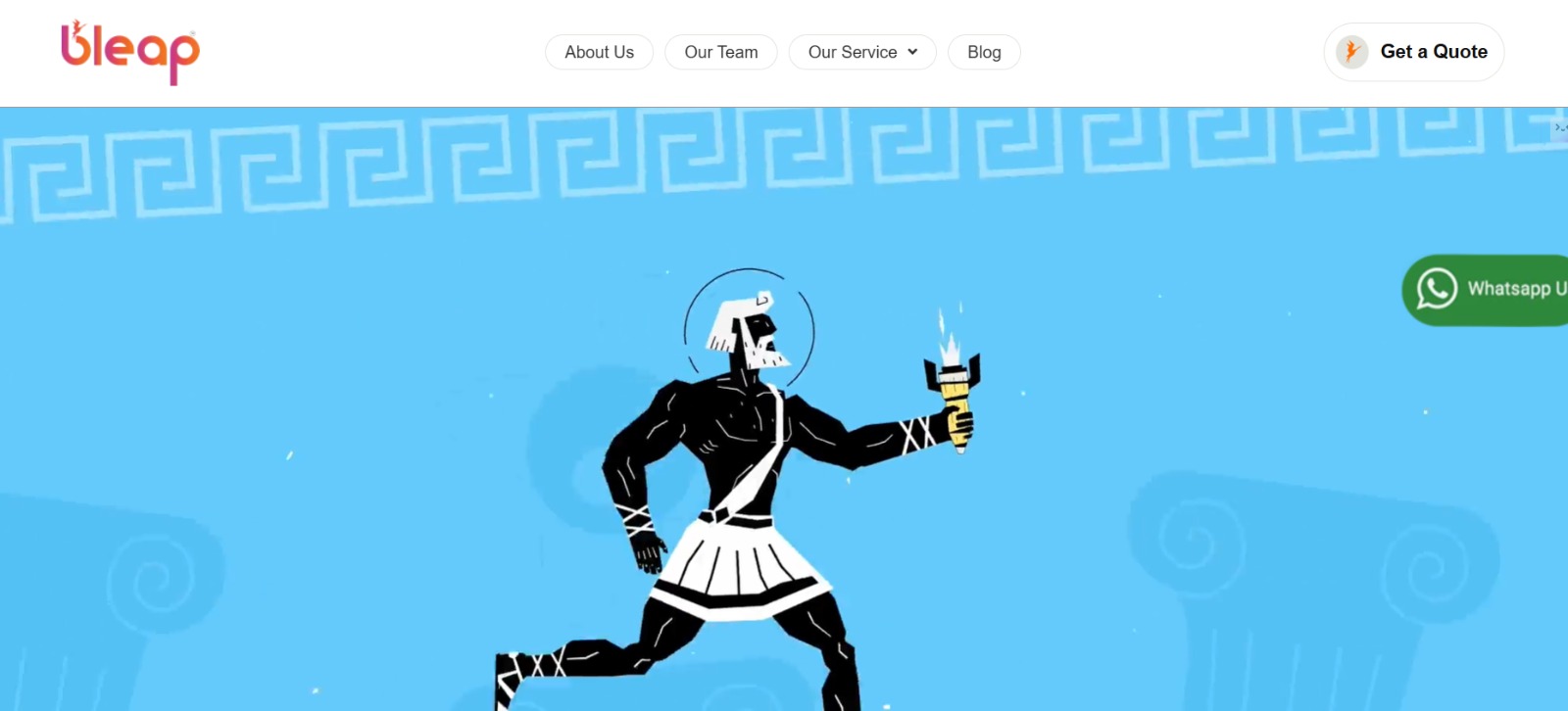
BLEAPDIGITAL
BLeap Digital is an award-winning digital marketing agency with a presence in both Bangalore and Chennai, trusted by over 170+ brands across industries. BLeap Digital has established itself as a reliable and ROI-focused digital marketing company in Bangalore. Known for its in-depth industry knowledge and custom marketing strategies, the agency has become a preferred choice for startups, local businesses, and emerging brands.
They offer a wide range of services, including SEO, Google Ads, social media marketing, website development, and creative production. Each service delivers with a focus on performance, creativity, and measurable return on investment (ROI). Clients praise BLeap for clear communication, performance-driven execution, and industry insight.
With a strong foundation in both service and product, BLeap Digital continues to be a trusted partner for businesses looking to grow intelligently in today’s competitive digital landscape.
Contact Details
Inbounderz
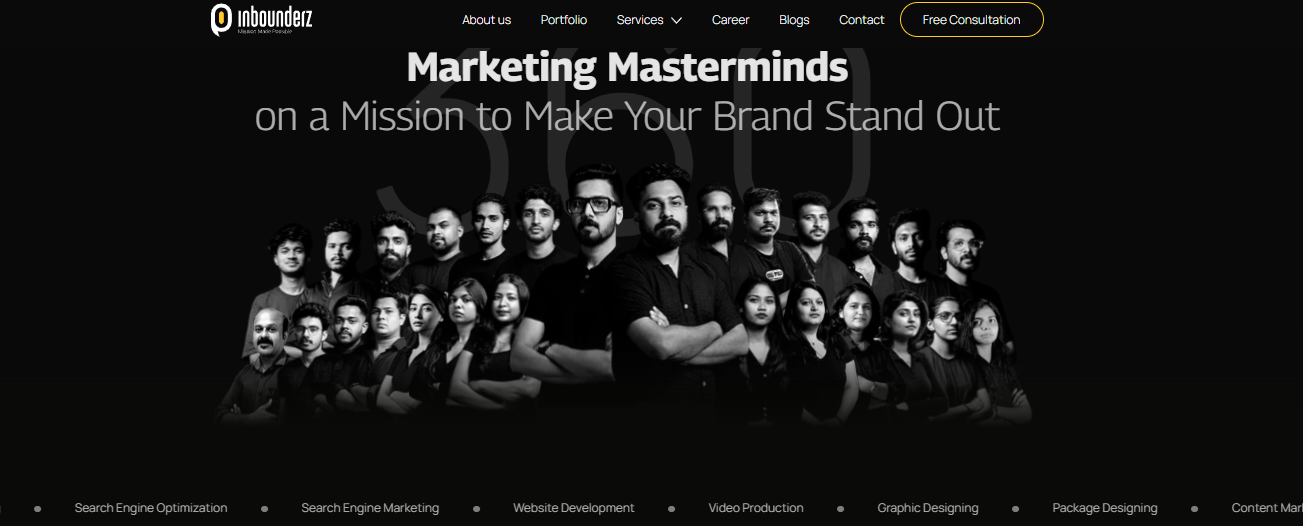
INBOUNDERZ
Inbounderz is a creative and performance-driven digital marketing agency based in Bangalore that has built a solid reputation for delivering ROI-focused digital solutions. With a strong focus on strategy and execution, Inbounderz supports businesses of all sizes to enhance their online visibility and achieve measurable growth.
The agency’s expertise spans corporate branding, search engine optimization (SEO), social media marketing, search engine marketing (SEM), and content marketing. What sets Inbounderz apart is its 360-degree digital approach, combining data, design, and technology to deliver impactful marketing outcomes.
Inbounderz also offers specialized services in website development, video production, UI/UX design, and packaging design, positioning itself as a full-service digital partner for brands aiming to scale.
In June 2025, Inbounderz was officially recognized as a Google Partner, further validating its capabilities in paid advertising and campaign performance management.
Clients frequently commend Inbounderz for its strategic thinking, creativity, responsiveness, and consistent delivery, making it one of the most dependable digital marketing agencies in Bangalore.
Contact Details
Honeycomb
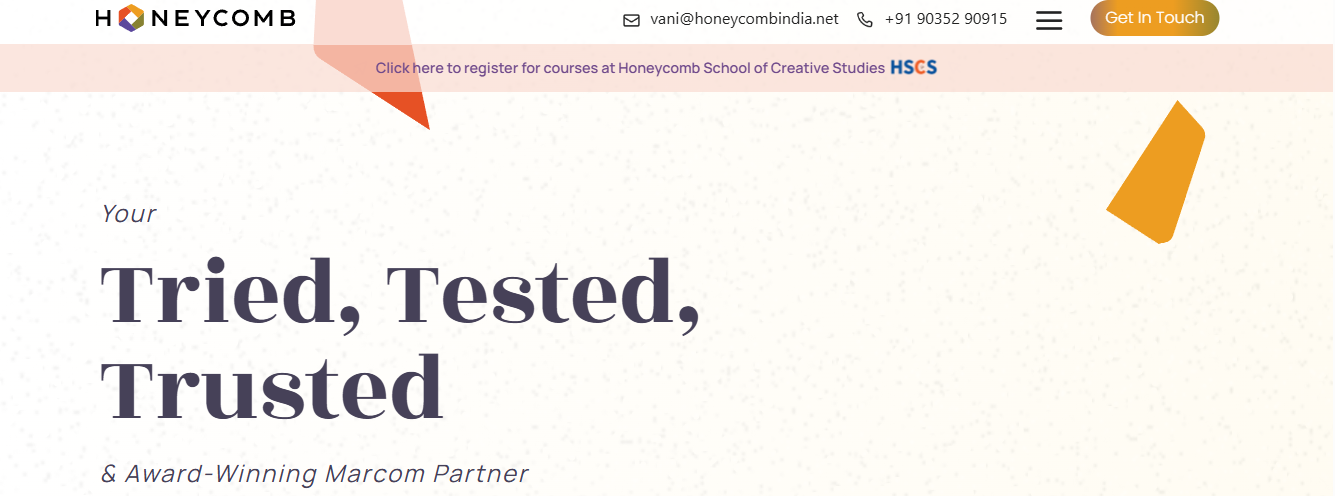
Honeycomb
Honeycomb Creative Support Pvt Ltd., is a full-service creative agency in Bangalore, known for its seamless blend of strategic insight and artistic excellence. . With more than 16 years of experience in the field, the agency is known for producing design-led, high-impact solutions that are both practical and visually striking.
They use an integrated approach to brand building and offer a full range of services, such as web design, UI/UX, digital marketing, SEO, content production, and social media marketing. Additionally, their team combines technical precision and creative finesse under one roof by bringing deep expertise in graphic design, video production, fine-art printing & proofing, and creative staff augmentation.
Clients often mention that they value their methodical processes, attention to detail, and unwavering focus on brand consistency. A large portion of their clientele has remained with them since inception, a testament to their ability to understand business challenges, take ownership, and execute with flair. From concept to delivery, Honeycomb exemplifies a commitment to quality and innovation, making it a trusted partner for businesses seeking a standout digital presence.
Contact Details
Skyram Technologies
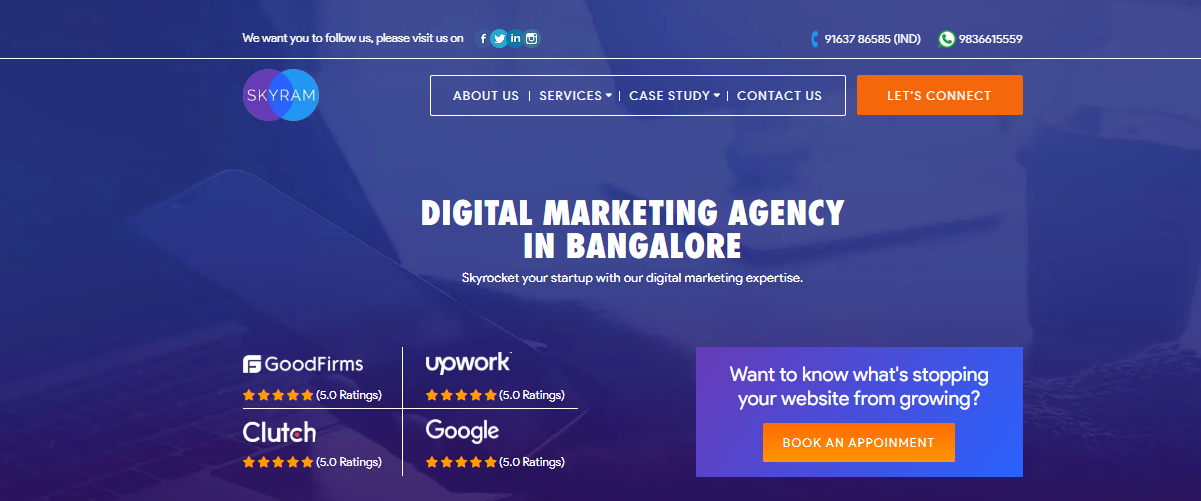
Skyram
Skyram Technologies is a results-driven digital marketing company with expertise in education-focused performance marketing and strategic enrollment planning. With a strong command over education-sector campaigns—including lead generation for colleges, coaching centres, EdTech platforms, and online certification providers—Skyram empowers institutions in Bangalore and beyond with tailored digital strategies that fuel admissions growth.
Their strengths lie in education-centric SEO, paid media strategies, student lifecycle marketing, and engagement. They ensure institutes maximize ROI through data-backed, high-converting campaigns. Skyram also excels in CRO (conversion rate optimization), remarketing, and advanced analytics to optimize the digital enrollment funnel from awareness to application.
In addition, their creative services and audience-first content marketing help academic brands build long-term trust and improve student engagement. Known for their consultative approach, education domain knowledge, and consistent results, Skyrim Technologies is regarded as a trusted leader among digital marketing companies specializing in the education sector in Bangalore.
Contact Details
Beta Digital marketing agency
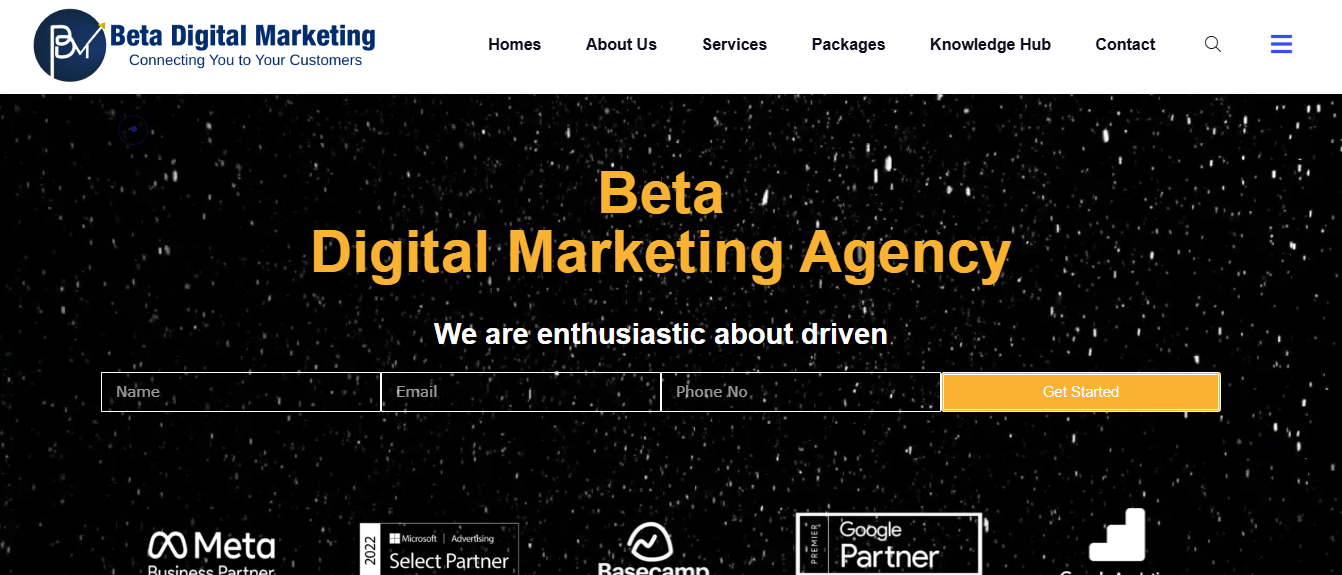
BETADIGITALMARKETING
Beta Marketing Agency has carved a niche in the Bangalore digital marketing landscape with a reputation for innovation and performance. It is known for delivering data-driven results and specializing in performance marketing, SEO, content marketing, and social media strategies. Beta Marketing Agency is a digital marketing company in Bangalore specializing in data-driven online marketing services.
Clients commend the company’s proactive approach, timely delivery, and strong customer support. The agency’s continuous optimization and in-depth analytics make it a go-to choice for companies looking for scalable growth and online visibility.
Contact Details
- Phone: +91 9513999901
- Email: [email protected]
- Website: https://betadigitalmarketing.com
conclusion
In today’s competitive digital marketplace, selecting the correct digital marketing company is critical to business growth. The agencies listed above—led by Oxygen, a highly experienced digital marketing company based in Hyderabad—represent some of the best digital marketing companies serving Bangalore. These companies bring unique strengths, from SEO and social media marketing to performance advertising and branding solutions.
Whether you’re a startup looking to establish your online presence or a growing enterprise aiming to scale your digital reach, partnering with any trusted agencies can help you achieve measurable and sustainable success. Your business can stand out and thrive in the ever-evolving digital marketplace with the right strategy and expert support.
FAQS
1. What services do top digital marketing agencies in Bangalore offer?
A. Leading digital marketing agencies in Bangalore typically offer search engine optimization (SEO), Google Ads (PPC), social media marketing, content marketing, web design, branding, and performance marketing services.
2. How do I choose the right digital marketing company in Bangalore?
A. Look for an agency with proven results, client testimonials, a strong digital presence, and services aligned with your goals. Experience, creativity, and transparency are key factors when selecting the best partner.
3. Is digital marketing affordable for small businesses?
A. Many digital marketing agencies in Bangalore offer flexible pricing and packages suitable for startups and small businesses. Companies like Cubikey Websites and BLeap Digital are known for delivering affordable, ROI-driven marketing solutions.
4. In what time frame can you anticipate seeing outcomes from digital
marketing?
A. The timeline varies depending on the strategy. SEO typically takes 3–6 months to show significant results, while PPC and social media campaigns can yield quicker outcomes. Consistent efforts and analytics help refine performance over time.
5. What should I expect during my first few months working with a digital
marketing agency?
A. The agency typically performs audits, strategy development, competitor analysis, and initial campaign setup in the initial months. You’ll start seeing early indicators of success—like traffic increase or improved engagement—with clear reporting and ongoing optimization. Results, especially in SEO, build over time with consistent effort.
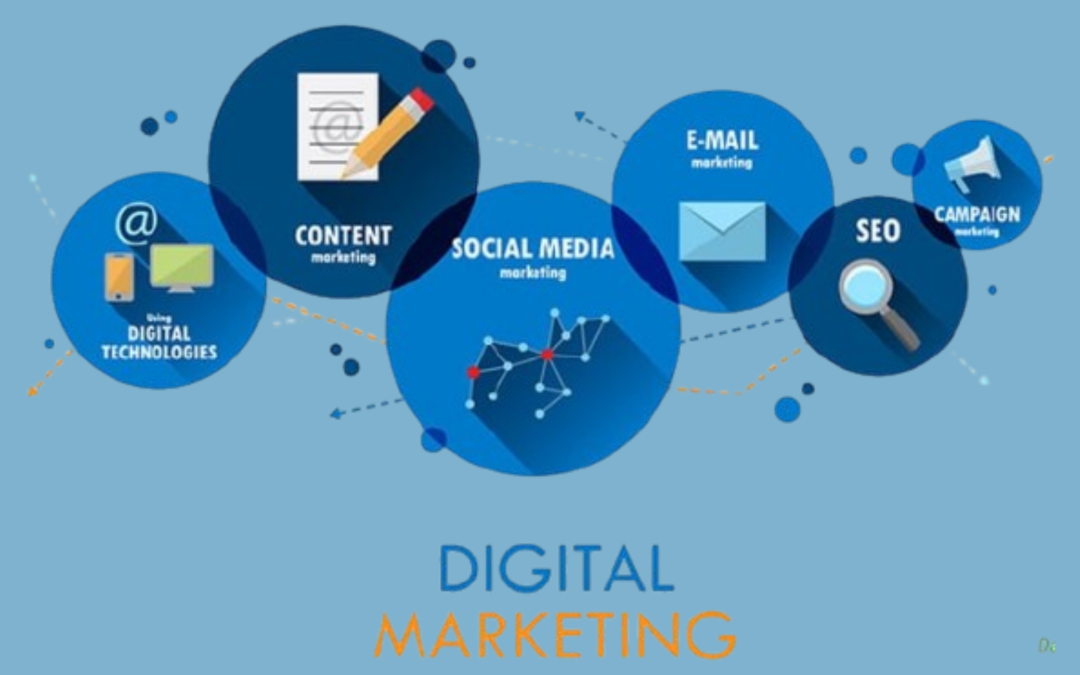
by Shashikanth Heerekar | Mar 15, 2025 | All Things about Marketing
Is digital marketing growing? Explore the latest trends, stats, and future insights to understand why digital marketing is booming in 2025 and beyond.
Introduction
Digital marketing has become an essential part of modern business strategies. Over the last decade, the digital marketing industry has seen unprecedented growth, transforming how businesses interact with customers, generate leads, and drive sales. As technology evolves, companies shift from traditional marketing methods to digital platforms, creating vast opportunities for growth and innovation. This article will explore how digital marketing is growing, the factors driving this growth, and why businesses must adopt digital strategies to stay competitive in the modern marketplace.
The Rapid Growth of Digital Marketing
The rise of the internet and mobile technology has significantly impacted how businesses reach consumers. According to recent reports, the global digital marketing industry is valued at over $350 billion and is expected to grow at a CAGR (Compound Annual Growth Rate) of 17.6% from 2024 to 2030. Several factors, including increased internet penetration, the rise of social media, and the growing use of mobile devices, drive this remarkable growth.As the demand for skilled professionals continues to rise, many aspiring marketers are enrolling in the best digital marketing institute in Hyderabad to gain hands-on knowledge and stay ahead in this rapidly evolving field.
1. Increased Internet Usage and Mobile Penetration
Today, more than 5.4 billion people worldwide have access to the internet, which translates to nearly 65% of the global population. This widespread connectivity has created a massive online audience, making it easier for businesses to engage with potential customers. Additionally, over 90% of internet users access the internet via smartphones, creating a mobile-first landscape where companies must optimize their strategies for mobile platforms.
2. The Rise of Social Media Marketing
Social media platforms such as Facebook, Instagram, TikTok, LinkedIn, and Twitter have become central to digital marketing strategies. Over 4.9 billion people actively use social media worldwide, providing businesses with direct access to potential customers. Paid advertising, influencer marketing, and organic content have become powerful tools for reaching target audiences and building brand awareness.
3. The Growth of E-Commerce and Online Shopping
The e-commerce sector has seen explosive growth, particularly after the COVID-19 pandemic. Global e-commerce sales are projected to reach $6.3 trillion in 2025. This shift has forced businesses to enhance their online presence through targeted advertising, content marketing, and search engine optimization (SEO) to capture consumer interest and drive sales.
Key Factors Driving the Growth of Digital Marketing
Several key factors are contributing to the rapid growth of digital marketing:
1. Data-Driven Decision Making
The availability of big data and advanced analytics tools allows businesses to track user behaviour, measure campaign performance, and optimize strategies in real-time. Tools such as Google Analytics, SEMrush, and HubSpot enable marketers to analyze key metrics and adjust their tactics for better results.
2. Personalization and Customer Targeting
Digital marketing enables businesses to create personalized customer experiences. Marketers can use artificial intelligence (AI) and machine learning to analyze customer behaviour and preferences to deliver tailored content and offers. Studies show that 80% of consumers are likelier to purchase from brands offering personalized experiences.
3. Automation and AI in Marketing
Marketing automation tools such as Mailchimp, Marketo, and ActiveCampaign have streamlined the process of managing email campaigns, social media posts, and customer interactions. AI-powered chatbots, predictive analytics, and automated content creation have also enhanced customer engagement and lead generation.
Types of Digital Marketing Driving Business Success
Digital marketing encompasses a wide range of strategies and channels that businesses use to reach their target audience:
1. Search Engine Optimization (SEO)
SEO remains a cornerstone of digital marketing. Businesses can improve their search rankings and drive organic traffic by optimizing website content for search engines. Effective SEO strategies include keyword research, on-page optimization, backlink building, and technical SEO improvements.
2. Pay-Per-Click Advertising (PPC)
PPC advertising allows businesses to display ads on search engines and social media platforms. Platforms like Google Ads and Facebook Ads enable companies to target specific demographics and pay only when users click on their ad. PPC campaigns provide quick visibility and measurable results.
3. Social Media Marketing
Social media platforms allow businesses to engage with customers directly, build brand loyalty, and drive website traffic. Engaging content, influencer collaborations, and paid promotions are effective strategies for expanding reach and increasing engagement.
4. Content Marketing
Content remains king in digital marketing. High-quality blogs, videos, infographics, and whitepapers help businesses establish authority, engage audiences, and improve SEO performance. According to statistics, companies that use content marketing generate 67% more leads than those that don’t.
5. Email Marketing
Email marketing remains one of the highest ROI-generating digital marketing channels. Personalized email campaigns, automated follow-ups, and segmentation strategies enable businesses to nurture leads and convert them into loyal customers.
6. Influencer Marketing
Influencer marketing leverages the reach and credibility of social media personalities to promote products and services. Studies show that 49% of consumers rely on influencer recommendations when purchasing.
Challenges in the Digital Marketing Industry
Despite its rapid growth, the digital marketing industry faces several challenges:
1. Increased Competition
As more businesses adopt digital marketing strategies, competition for online visibility and customer attention has intensified. To stand out, companies must develop unique and engaging content.
2. Privacy Regulations and Data Protection
With the introduction of privacy laws such as the General Data Protection Regulation (GDPR) and the California Consumer Privacy Act (CCPA), businesses must comply with strict data protection regulations while collecting and using customer data.
3. Ad Fatigue and Consumer Trust Issues
Consumers are exposed to thousands of ads daily, leading to ad fatigue and declining engagement rates. To overcome this, businesses must focus on delivering high-quality, relevant content and building trust with their audience.
Future Trends in Digital Marketing
Several emerging trends will shape the future of digital marketing:
1. Voice Search Optimization
With the growing use of voice assistants like Alexa and Google Assistant, optimizing content for voice search will become crucial for maintaining search visibility.
2. Video Marketing and Live Streaming
Video content continues to gain popularity, with platforms like YouTube, Instagram, and TikTok driving engagement. Live streaming and interactive videos will grow significantly in the coming years.
3. AI and Machine Learning
AI-powered marketing tools will continue to improve customer targeting, content creation, and campaign performance. Predictive analytics and automated decision-making will enhance marketing efficiency.
4. Augmented Reality (AR) and Virtual Reality (VR)
AR and VR technologies will provide immersive brand experiences, allowing customers to interact with products and services virtually.
Conclusion
Digital marketing is growing at an unprecedented pace, driven by technological advancements, changing consumer behaviour, and the increasing importance of data-driven strategies. Businesses that adapt to these changes and leverage digital marketing effectively will gain a competitive edge in the marketplace. From SEO and content marketing to social media and AI-driven automation, the opportunities in digital marketing are vast and continue to expand. As the digital landscape evolves, businesses must stay ahead by embracing innovative strategies and adapting to changing market conditions.
FAQ’s About Digital Marketing Growth
1. Why is digital marketing growing so fast?
Digital marketing is growing rapidly due to increased internet usage, mobile penetration, and the rise of social media. Businesses are shifting from traditional marketing to online platforms because it allows them to reach a wider audience, target specific demographics, and measure results more accurately. The demand for data-driven strategies and personalized customer experiences also fuels this growth.
2. How does social media impact digital marketing growth?
Social media platforms like Facebook, Instagram, and TikTok provide businesses with direct access to billions of users. Marketers can create targeted ads, engage with followers, and collaborate with influencers to increase brand awareness and drive traffic. The ability to track performance in real time makes social media a powerful tool for growth.
3. What are the most effective types of digital marketing?
SEO, PPC advertising, content marketing, social media marketing, and email marketing are the most effective types of digital marketing. Each strategy helps businesses increase visibility, generate leads, and build customer relationships. Combining these methods enhances overall marketing performance.
4. What challenges do businesses face in digital marketing?
Businesses face increased competition, privacy regulations, and ad fatigue. With more companies adopting digital strategies, it’s harder to stand out. Privacy laws like GDPR and CCPA require careful customer data handling, while overexposure to ads can reduce customer engagement.
5. What is the future of digital marketing?
The future of digital marketing includes AI-driven automation, voice search optimization, video marketing, and AR/VR experiences. Personalization and predictive analytics will play a significant role in improving customer targeting and engagement. Businesses that adapt to these trends will maintain a competitive edge.
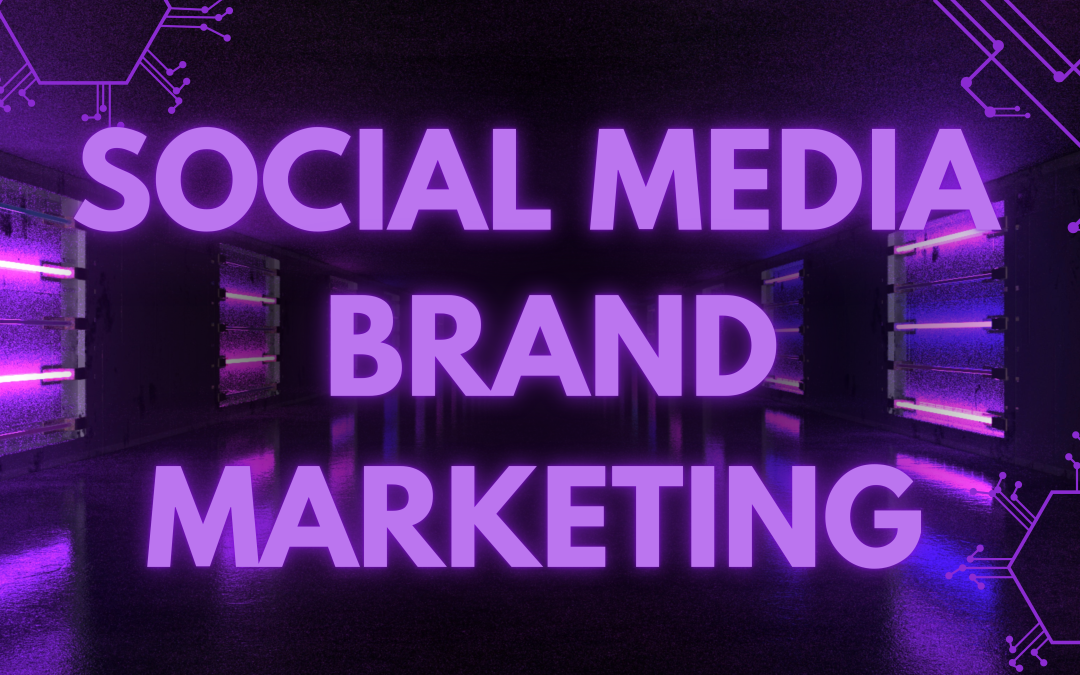
by Shashikanth Heerekar | Feb 1, 2025 | Technology
Social media brand marketing has become the cornerstone of successful business strategies in today’s digital landscape. This comprehensive guide explores how businesses can leverage social platforms to build strong, lasting brand identities and meaningful connections with their audience.
Understanding Social Media Branding
Social media branding is the process of establishing and maintaining a unique brand identity across digital platforms. It involves a strategic combination of visual design, messaging, and audience engagement to create a consistent and memorable brand experience. In today’s digital world, where 90% of consumers engage with brands online before making purchasing decisions, a well-defined social media branding strategy is essential for success. Businesses that invest in strong branding build trust increase visibility and cultivate loyal communities. Below are key components of social media branding that businesses should focus on.
Brand Identity: Your Unique Visual and Verbal Presence Across Platforms
A strong brand identity ensures that your business is instantly recognizable across all social media channels. This includes your logo, colour palette, typography, and brand voice, which should remain consistent across platforms. Whether you aim for a professional, fun, or innovative tone, your messaging should reflect your brand’s core values. Visual elements like profile pictures, cover images, and post aesthetics should align with your overall branding to create a seamless experience. A well-crafted brand identity differentiates you from competitors and helps build lasting impressions with your audience. Consider utilising an AI logo generator to maintain a unified brand image across all online platforms.
For example, brands like Nike and Coca-Cola have mastered the art of visual and verbal consistency. Their logos, colours, and messaging are instantly recognizable, creating a strong emotional connection with their audience.
Customer Engagement: Direct Interaction with Your Target Audience
Engaging directly with your audience is crucial for building relationships and strengthening brand loyalty. Social media provides an interactive platform where businesses can respond to comments, answer queries, and acknowledge feedback in real-time. Hosting live sessions, Q&A interactions, and polls can further enhance customer engagement. Personalization plays a key role in making customers feel valued—responding by name or addressing specific concerns can leave a lasting impact. By fostering two-way communication, brands can humanize their identity and create a more approachable image.
According to a study by Sprout Social, 89% of consumers say they are more likely to purchase from a brand they follow on social media. This highlights the importance of building genuine connections with your audience.
Content Strategy: Consistent Messaging That Reflects Brand Values
A well-planned content strategy ensures that all posts align with your brand’s mission, vision, and values. Your messaging should be clear, relatable, and tailored to your audience’s preferences. Different content formats, such as educational posts, storytelling, behind-the-scenes glimpses, and user-generated content, can help maintain engagement. Additionally, maintaining a balance between promotional and value-driven content ensures that your audience remains engaged rather than feeling overwhelmed by constant advertisements. Strategic storytelling helps convey brand authenticity and fosters emotional connections with followers.
For example, Dove leverages social media to share empowering stories, promoting self-love. Their content aligns with brand values of inclusivity and authenticity. This approach strengthens their connection with a diverse audience
Essential Branding Strategies
Building a strong brand on social media requires thoughtful strategy and execution. Consistent messaging and visual identity are key to creating recognition. Engaging content and meaningful interactions foster stronger relationships. These strategies ensure brand effectiveness across platforms.
Visual Consistency: Maintain Unified Design Elements Across Platforms
Consistency in branding helps establish recognition and trust. Brands should use the same color schemes, fonts, and imagery across all platforms to create a cohesive identity. Social media profiles, including profile pictures and banner images, should align with the website and other marketing materials. Maintaining a consistent theme in post layouts, filters, and graphics also enhances brand recall. Cohesive branding reinforces professionalism and makes content instantly recognizable to followers.
For example, Apple maintains a minimalist and sleek design across all social media platforms. This consistent approach reinforces its brand identity. It positions Apple as a leader in innovation and simplicity. The design style enhances recognition and brand loyalty
Content Calendar: Regular, Planned Content Delivery
A content calendar helps maintain a steady flow of posts, ensuring timely and strategic content delivery. It prevents last-minute scrambling for ideas and ensures that content aligns with important dates, campaigns, and industry trends. Businesses should plan content for different formats, such as images, videos, infographics, and blog shares, to maintain variety. A well-organized schedule allows brands to maintain engagement and reach their audience at optimal times. Consistent posting signals reliability and keeps followers engaged over time.
For example, HubSpot reports that brands posting consistently on social media experience a 30% higher engagement rate. Regular posting helps maintain audience interest and visibility. This consistent activity strengthens connections with followers. It leads to better overall engagement and brand growth.
Community Management: Active Engagement with Followers
Successful brands actively manage and nurture their online communities by engaging with their audience consistently. Monitoring comments, messages, and mentions allows brands to respond promptly and address customer concerns. Encouraging discussions, sharing user-generated content, and creating brand-centric hashtags can strengthen community ties. Active community management fosters loyalty and positions a brand as approachable and customer-focused. Brands that genuinely interact with their followers build trust and long-term relationships.
For example, Starbucks actively engages with followers by responding to comments and sharing user-generated content. They create interactive campaigns, like the #RedCupContest, to encourage participation. This encourages a sense of community and connection. Such engagement strengthens their brand presence on social media.
Platform Selection and Approach
Each social media platform targets a distinct audience and serves a specific purpose. Selecting the right platforms is crucial for reaching the desired demographic. Tailoring content to each platform enhances engagement and impact. This strategic approach maximizes brand visibility and effectiveness.
Instagram: Visual Storytelling (2.35 Billion Users)
Instagram is an ideal platform for brands that rely on high-quality visuals to engage their audience. It is perfect for industries like fashion, beauty, travel, and lifestyle. Features like Stories, Reels, and Instagram Shopping allow brands to showcase products creatively. User-generated content and influencer collaborations can further enhance brand visibility. A strong Instagram presence with eye-catching imagery and compelling captions helps businesses capture audience interest.
For example, Glossier has grown a massive following on Instagram by using user-generated content. They create visually appealing posts that resonate deeply with their audience. This approach fosters a sense of community and brand loyalty. It allows Glossier to connect authentically with its followers.
LinkedIn: Professional Networking (875 Million Users)
LinkedIn is the go-to platform for B2B businesses, industry leaders, and professionals looking to establish thought leadership. Content on LinkedIn should focus on industry insights, business updates, and professional development. Brands can leverage LinkedIn articles, long-form posts, and engagement in relevant discussions to position themselves as experts. Employee advocacy and company culture posts also enhance credibility. LinkedIn advertising helps businesses target decision-makers and generate high-quality leads.
For instance, Microsoft uses LinkedIn to share thought leadership articles and company updates. They highlight employee stories to showcase their company culture. This positions Microsoft as a leader in the tech industry. Their content strategy builds authority and trust within their professional network.
Facebook: Community Building (2.9 Billion Users)
Facebook remains one of the most powerful platforms for community engagement and brand storytelling. It is ideal for businesses aiming to build customer relationships through groups, events, and interactive posts. Brands can use Facebook Ads to reach highly specific audience segments based on demographics, interests, and behaviour. Engaging with followers through comments, live sessions, and polls helps maintain active brand participation. Businesses that create value-driven content can foster a loyal customer base on Facebook.
For example, Sephora uses Facebook to create beauty communities and engage with followers. They share tutorials and host live Q&A sessions to educate their audience. This approach helps build a strong connection with their followers. Sephora’s interactive content fosters loyalty and enhances brand engagement.
Measuring Brand Success
Measuring brand success requires tracking key performance metrics to assess social media efforts. Brands should utilize analytics tools to monitor engagement and audience behaviour. These insights assist in optimizing content strategy for better results. Regular analysis ensures continuous improvement and brand growth.
Engagement Rates: Track Likes, Comments, and Shares
Engagement rate is a key indicator of how well a brand resonates with its audience. High engagement—measured by likes, shares, comments, and reactions—signals that content is valuable and relatable. Brands should analyze which types of content receive the most interaction and refine their strategies accordingly. Interactive posts, questions, and polls can help boost engagement. Consistently analyzing engagement metrics helps businesses understand audience preferences and improve content performance. Social media reporting provides detailed breakdowns of these metrics for strategic decision-making.”This ongoing evaluation allows brands to stay relevant and maintain strong connections. Monitoring trends in engagement also uncover opportunities for growth and innovation. By adapting to these insights, brands can strengthen their online presence.
Brand Sentiment:
Conversion Metrics: Measure Action from Social Efforts
Social media branding efforts should translate into tangible business outcomes. Tracking conversions, such as website visits, lead generation, and sales, helps measure the ROI of social campaigns. Using UTM parameters and tracking links can determine which platforms drive the most conversions. Optimizing call-to-actions (CTAs) and refining ad strategies can further boost conversion rates. Regularly reviewing conversion data allows businesses to make data-driven marketing decisions.
In addition to monitoring direct conversions, brands should also track the customer journey from social media interaction to final purchase. By understanding where drop-offs occur and which touchpoints drive the most engagement, businesses can fine-tune their marketing efforts. A/B testing different CTAs, ad formats, and content types can reveal what resonates best with the audience and leads to higher conversion rates. Furthermore, segmenting data by demographics and behaviours enables businesses to tailor their strategies to different audience groups for more effective targeting. With this level of detail, brands can optimize their social media strategies to increase not just engagement but actual business outcomes.
Best Practices
To ensure effective social media branding, businesses should follow these best practices:
- Post consistently and at optimal times to maximize engagement and audience reach.
- Respond promptly to comments and messages to build trust and enhance customer relationships.
- Use platform-specific features effectively, such as Instagram Reels, LinkedIn articles, and Facebook groups.
- Leverage user-generated content to build authenticity and strengthen community connections.
- Monitor analytics regularly to refine content strategies and improve performance.
Data Visualization: Social Media Platform Usage
To better understand the distribution of social media users, here’s a breakdown of active users across major platforms:
- Facebook: 2.9 billion users (40%)
- Instagram: 2.35 billion users (32%)
- LinkedIn: 875 million users (12%)
- Twitter: 450 million users (6%)
- TikTok: 1 billion users (10%)
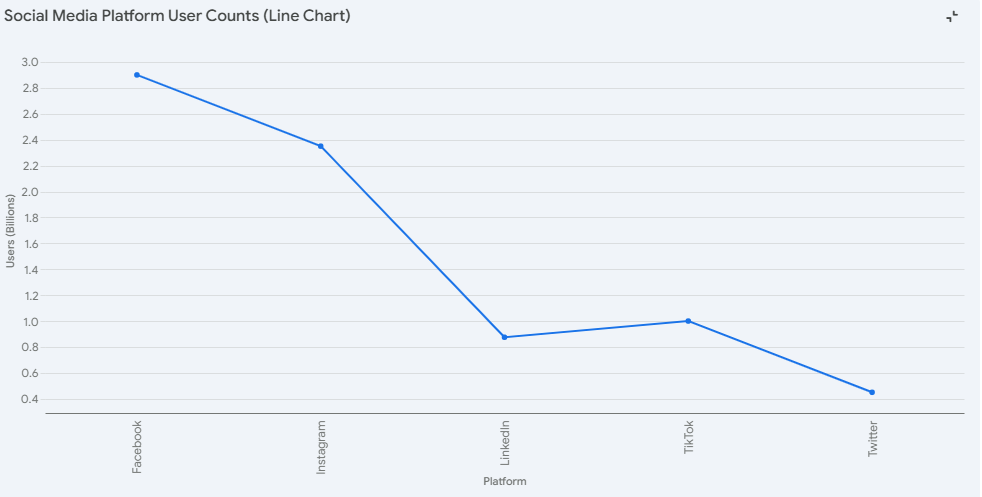
This breakdown highlights the dominance of Facebook and Instagram, while platforms like LinkedIn, Twitter, and TikTok cater to niche audiences and specific marketing goals.
Conclusion
Social media brand marketing is an indispensable tool for businesses aiming to build a strong digital identity and connect with their audience. By focusing on brand identity, customer engagement, and a well-planned content strategy, businesses can create a cohesive and memorable brand presence. Selecting the right platforms, maintaining visual consistency, and actively managing your community are essential steps toward success. Regularly measuring engagement, brand sentiment, and conversion metrics ensures that your efforts yield tangible results. By following best practices and staying adaptable to trends, businesses can thrive in the ever-evolving world of social media.
Building a strong social media brand goes beyond just posting content—it’s about creating an experience that resonates with your audience. By offering value through educational posts, entertainment, or inspiration, brands can position themselves as authorities in their niche. Additionally, fostering authentic relationships with followers helps build trust and loyalty, which can lead to long-term customer retention. Brands should also embrace innovation by experimenting with new content formats, such as live streams, Stories, or interactive polls, to stay fresh and engaging. A flexible approach allows businesses to continuously evolve, keeping their brand relevant and engaging in an increasingly competitive digital landscape. By staying proactive in their strategy, businesses can maintain momentum and stay connected with their audience effectively.
FAQs on Social Media Brand Marketing
1. What is social media brand marketing?
Social media brand marketing involves using platforms like Instagram, Facebook, and TikTok to promote a brand, engage with audiences, and build a strong online presence. It focuses on creating content that resonates with the target audience, increasing brand awareness, and driving business goals like sales or loyalty.
2. Which social media platform is best for brand marketing?
The best platform depends on your audience and goals. Instagram is great for visuals and younger audiences, Facebook for broad reach, LinkedIn for B2B, TikTok for short-form videos, and Twitter for real-time engagement. Choose platforms where your target audience is most active.
3. How can I increase engagement on my social media posts?
Post high-quality, relatable content that adds value to your audience. Use eye-catching visuals, ask questions, and encourage comments. Engage with your followers by responding to comments and messages. Run contests, polls, or giveaways to boost interaction.
4. What are the benefits of using influencers in social media marketing?
Influencers help amplify your brand’s reach and credibility. They connect with their followers authentically, making their recommendations more trustworthy. Collaborating with influencers can drive engagement, increase brand awareness, and boost sales, especially when their audience aligns with your target market.
5. How do I measure the success of my social media marketing efforts?
Track key metrics like engagement rate (likes, comments, shares), reach, impressions, click-through rate (CTR), and conversion rate. Use platform analytics tools (e.g., Instagram Insights, Facebook Analytics) or third-party tools to monitor performance and adjust your strategy based on data.
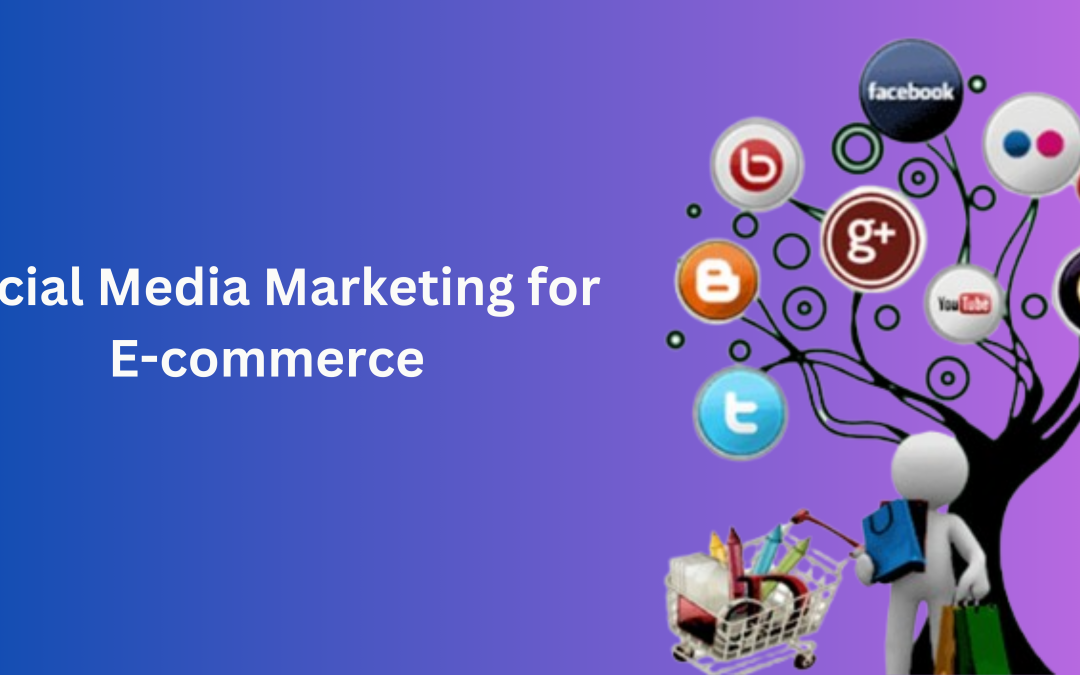
by Shashikanth Heerekar | Feb 1, 2025 | Technology
Transform your e-commerce business with the power of social media. Learn how to leverage platforms like Facebook, Instagram, and Twitter to drive traffic, boost conversions, and increase sales in our expert guide.
Introduction to Social Media Marketing for E-commerce
Social media marketing entails utilizing social media platforms to promote products or services, interact with clients, and raise brand awareness. For e-commerce businesses, this means creating a strong online presence, driving traffic to their websites, and converting followers into loyal customers. Examples of e-commerce businesses like Amazon and Shopify have successfully leveraged social media to grow their customer base and increase sales.
The dynamic nature of social media allows e-commerce businesses to reach a global audience, engage with customers in real-time, and gather valuable insights into consumer behaviour. By leveraging the power of social media, e-commerce businesses can create personalized experiences, foster customer loyalty, and ultimately drive sales. Social commerce examples like Instagram Shopping and Facebook Shops have revolutionized the way consumers shop online.
Why Social Media Marketing is Crucial for E-commerce
1. Increased Brand Visibility
Social media platforms are powerful tools for boosting brand visibility, offering access to billions of active users worldwide. By sharing consistent, high-quality content such as images, videos, and stories, e-commerce businesses can capture the attention of a broader audience. Platforms like Instagram and Facebook provide features like hashtags and geotags, which help expand reach and attract potential customers. Collaborating with influencers or running targeted ad campaigns can further enhance visibility. In a crowded digital space, maintaining an active social media presence is key to staying relevant and competitive.
Additionally, social media allows brands to engage directly with their audience, fostering stronger connections and trust. Interactive features like polls, Q&A sessions, and live streams enable businesses to communicate in real time, creating a sense of community. Personalized content tailored to audience preferences can make a brand more relatable and memorable. By analyzing engagement metrics, businesses can refine their strategies to maximize visibility and impact. Ultimately, a well-executed social media strategy can transform a brand into a recognizable and trusted name in the market.
2. Enhanced Customer Engagement
Social media serves as a direct channel for businesses to engage with their customers, creating opportunities for meaningful interactions. By responding promptly to comments, messages, and reviews, brands can build stronger relationships with their audience. Features like polls, Q&A sessions, and live videos allow businesses to gather feedback and address customer concerns in real time. This level of engagement fosters a sense of community, making customers feel valued and heard. As a result, businesses can cultivate trust and loyalty, which are essential for long-term success.
Moreover, social media platforms enable businesses to personalize their interactions, enhancing the overall customer experience. By tailoring content to match customer preferences and interests, brands can create more relevant and engaging conversations. Sharing user-generated content, hosting contests, or offering exclusive deals further strengthens the bond between the brand and its audience. These strategies not only boost engagement but also encourage customers to become brand advocates. In the e-commerce landscape, effective customer engagement through social media can significantly impact customer satisfaction and retention.
3. Cost-Effective Marketing
Social media marketing offers a cost-effective solution for businesses, especially when compared to traditional advertising methods like TV or print. Platforms such as Facebook and Instagram provide highly targeted advertising options, allowing businesses to reach specific demographics, interests, and behaviours. This precision ensures that marketing budgets are spent efficiently, maximizing return on investment. Additionally, organic reach through engaging posts and stories can further amplify visibility without additional costs. For small and medium-sized e-commerce businesses, social media marketing is an accessible and affordable way to compete in the digital marketplace.
Furthermore, the flexibility of social media advertising allows businesses to start with small budgets and scale up as they see results. Tools like Facebook Ads Manager and Instagram Insights provide detailed analytics, helping businesses track performance and optimize campaigns in real time. Promotions, discounts, and influencer collaborations can also be executed at a fraction of the cost of traditional methods. By leveraging these cost-effective strategies, e-commerce businesses can achieve significant growth without overspending. Social media marketing proves that impactful advertising doesn’t always require a hefty budget.
4. Improved Customer Insights
Social media platforms provide powerful analytics tools that give businesses deep insights into customer behaviour and preferences. By analyzing metrics such as engagement rates, click-through rates, and audience demographics, companies can better understand their target market. This data helps in identifying trends, preferences, and pain points, enabling businesses to tailor their marketing strategies effectively. For example, Instagram Insights and Facebook Analytics offer detailed reports on post performance and audience interactions. These insights empower e-commerce businesses to make data-driven decisions and optimize their campaigns for better results.
Additionally, social media analytics allow businesses to create more personalized and relevant experiences for their customers. By understanding what content resonates most, brands can craft messages that align with their audience’s interests and needs. Tracking customer interactions also helps in segmenting audiences for targeted campaigns, improving conversion rates. Tools like heatmaps and sentiment analysis further enhance the ability to gauge customer satisfaction and loyalty. With these insights, e-commerce businesses can build stronger relationships with their customers and stay ahead in a competitive market.
5. Higher Conversion Rates
Social media marketing is a powerful tool for driving traffic to e-commerce websites, ultimately leading to higher conversion rates. By showcasing products through visually appealing posts, stories, and videos, businesses can capture the interest of potential customers. Sharing customer testimonials and reviews builds trust and credibility, encouraging followers to make a purchase. Platforms like Instagram and Pinterest offer features such as shoppable posts, making it easier for users to buy directly from social media. Exclusive deals and limited-time offers further incentivize customers to take action, boosting sales and conversions.
Moreover, social commerce platforms streamline the purchasing process, reducing friction and increasing the likelihood of conversions. For instance, Instagram’s “Shop Now” button and Pinterest’s product pins allow users to make purchases without leaving the app. Targeted ads and retargeting campaigns ensure that your products are seen by users who have already shown interest. By leveraging these tools, businesses can create a seamless shopping experience that drives results. With the right strategy, social media can transform casual followers into loyal customers, significantly improving conversion rates.
Key Social Media Platforms for E-commerce
1. Facebook
With over 2.8 billion monthly active users, Facebook is the largest social media platform, making it a must-have in your social media marketing strategy. E-commerce businesses can create a Facebook Page to showcase their products, share updates, and engage with customers. Facebook Ads also offer advanced targeting options, allowing businesses to reach their ideal audience. Facebook shop examples like Nike and Zara demonstrate the effectiveness of Facebook for e-commerce.
Facebook’s extensive user base and robust advertising tools make it an essential platform for e-commerce businesses. By creating a Facebook Page, businesses can build a community around their brand, share product updates, and interact with customers directly. The platform’s advanced targeting options in Facebook Ads enable businesses to reach specific demographics, ensuring that their marketing efforts are directed toward the right audience. Successful examples like Nike and Zara highlight how Facebook can drive e-commerce growth through effective product showcasing and customer engagement.
2. Instagram
Instagram is a visually-driven platform that is perfect for e-commerce businesses. With 1.2 billion monthly active users and features like Instagram Shopping, businesses can tag products in their posts, making it easy for users to purchase directly from the app. Instagram Stories and IGTV also provide opportunities for creative content and behind-the-scenes glimpses. Instagram store examples like Fashion Nova and Glossier showcase the power of Instagram for e-commerce.
The visual nature of Instagram makes it an ideal platform for e-commerce businesses to showcase their products. Features like Instagram Shopping allow businesses to tag products in posts, enabling users to make purchases without leaving the app. Additionally, Instagram Stories and IGTV offer creative ways to share behind-the-scenes content and engage with followers. Brands like Fashion Nova and Glossier have successfully leveraged Instagram to build a strong online presence and drive sales, demonstrating the platform’s effectiveness for e-commerce.
3. Twitter
Twitter is known for its real-time updates and concise content. With 330 million monthly active users, e-commerce businesses can use Twitter to share quick updates, promote deals, and engage with customers through hashtags and mentions. Twitter Ads also offer targeting options to reach a specific audience. Social media commerce on Twitter is particularly effective for time-sensitive promotions.
Twitter’s fast-paced environment makes it a valuable platform for e-commerce businesses looking to share timely updates and promotions. With 330 million monthly active users, businesses can use hashtags and mentions to engage with customers and amplify their reach. Twitter Ads provide additional targeting options, allowing businesses to focus their efforts on specific audiences. The platform’s real-time nature makes it especially effective for time-sensitive promotions, helping businesses drive urgency and sales.
4. LinkedIn
While LinkedIn is primarily a professional networking platform, it can also be valuable for B2B e-commerce businesses. With 774 million monthly active users, LinkedIn allows businesses to share industry insights, connect with other professionals, and promote their products or services through LinkedIn Ads. Examples of e-commerce businesses using LinkedIn include software companies and consulting firms.
LinkedIn’s professional focus makes it an excellent platform for B2B e-commerce businesses. With 774 million monthly active users, businesses can share industry insights, network with other professionals, and promote their products or services through LinkedIn Ads. The platform is particularly effective for businesses in sectors like software and consulting, where professional connections and industry expertise are key. By leveraging LinkedIn, B2B e-commerce businesses can build credibility and reach a targeted audience of professionals.
5. Pinterest
Pinterest is a visual discovery platform that is ideal for e-commerce businesses, especially those in the fashion, home decor, and lifestyle niches. With 459 million monthly active users, by creating visually appealing pins and linking them to your website, you can drive traffic and increase sales. Social commerce examples on Pinterest include brands like Home Depot and Etsy.
Pinterest’s focus on visual discovery makes it a powerful tool for e-commerce businesses in niches like fashion, home decor, and lifestyle. With 459 million monthly active users, businesses can create visually appealing pins that link directly to their websites, driving traffic and boosting sales. The platform’s user base often seeks inspiration and ideas, making it an ideal place for businesses to showcase their products. Successful examples like Home Depot and Etsy demonstrate how Pinterest can be used to effectively promote e-commerce offerings.
6. TikTok
TikTok has quickly gained popularity, especially among younger viewers. With 1 billion monthly active users, e-commerce businesses can leverage TikTok’s short-form video content to showcase their products, participate in trends, and collaborate with influencers. Social e-commerce examples on TikTok include brands like Gymshark and Elf Cosmetics.
TikTok’s explosive growth and popularity among younger audiences make it a valuable platform for e-commerce businesses. With 1 billion monthly active users, businesses can use TikTok’s short-form video format to showcase products, participate in viral trends, and collaborate with influencers. The platform’s engaging content style allows businesses to connect with a younger demographic in a creative and authentic way. Brands like Gymshark and Elf Cosmetics have successfully used TikTok to drive brand awareness and sales, highlighting its potential for social e-commerce.
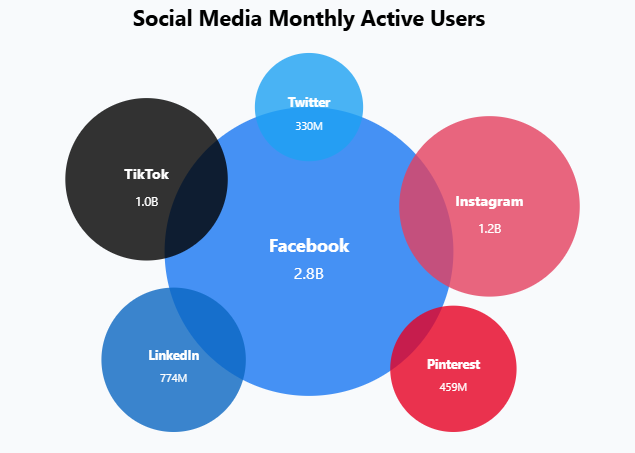
social media monthly active users
Developing a Social Media Marketing Strategy
1. Setting Clear Objectives
Before getting into social media marketing, it is critical to establish clear goals. Whether it’s increasing brand awareness, driving website traffic, or boosting sales, having defined goals will guide your strategy and help measure success. Examples of e-commerce businesses like Amazon and Shopify have clear objectives for their social media marketing efforts.
Setting clear objectives is the foundation of any successful social media marketing strategy. Whether the goal is to increase brand awareness, drive traffic to a website, or boost sales, having well-defined objectives helps guide decision-making and measure success. E-commerce giants like Amazon and Shopify exemplify the importance of setting clear goals, as their social media efforts are aligned with their broader business objectives. By establishing what you want to achieve, you can create a focused and effective social media strategy.
2. Identifying Your Target Audience
Understanding your target demographic is critical to efficient social media marketing. Consider age, gender, location, interests, and internet behaviour. This information will help you create content that resonates with your audience and choose the right platforms to focus on. Social media and e-commerce strategies are most effective when tailored to the target audience.
Identifying your target audience is a critical step in developing a successful social media marketing strategy. By understanding factors like age, gender, location, interests, and online behaviour, businesses can create content that resonates with their audience and select the most appropriate platforms. Tailoring your strategy to your target audience ensures that your efforts are relevant and impactful. Effective social media and e-commerce strategies are built on a deep understanding of who your customers are and what they want.
3. Creating Engaging Content
Content is the backbone of social media marketing. For e-commerce businesses, this includes product photos, videos, customer testimonials, and behind-the-scenes content. High-quality, visually appealing content is more likely to capture attention and encourage engagement. Using an ai video generator, businesses can easily create professional and engaging video content to showcase their products, highlight customer reviews, and tell compelling brand stories. Instagram captions for e-commerce examples like “Shop now and get 20% off!” can drive engagement and sales.
Creating engaging content is essential for capturing the attention of your audience and driving social media success. For e-commerce businesses, this means sharing high-quality product photos, videos, customer testimonials, and behind-the-scenes glimpses. Visually appealing content is more likely to stand out and encourage interaction. Using apps like CapCut can help streamline the creation of polished, eye-catching videos without the need for advanced editing skills. Examples like Instagram captions offering discounts, such as “Shop now and get 20% off!”, show how great content may increase both engagement and sales.
4. Leveraging Influencer Marketing
Influencer marketing involves collaborating with social media influencers to promote your products. Influencers have a loyal following, and their endorsements can have a big impact on purchasing decisions. To get the best results, choose influencers whose audiences are similar to your target market. Social e-commerce examples like Gymshark and Fashion Nova have successfully used influencer marketing.
Influencer marketing is a powerful tool for e-commerce businesses looking to expand their reach and credibility. By partnering with influencers who have loyal followings, businesses can tap into new audiences and drive purchasing decisions. It’s important to choose influencers whose audience aligns with your target market to ensure the best results. Brands like Gymshark and Fashion Nova have effectively used influencer marketing to build their online presence and boost sales, showcasing the potential of this strategy.
5. Utilizing Paid Advertising
While organic reach is important, paid advertising can help boost your social media presence. Platforms like Facebook, Instagram, and Twitter offer various ad formats, including image ads, video ads, and carousel ads. Use targeting options to reach your desired audience and maximize ROI. E-commerce marketing examples like Facebook Ads and Instagram Ads demonstrate the effectiveness of paid advertising.
Paid advertising is a crucial component of a comprehensive social media marketing strategy. While organic reach is important, paid ads can significantly amplify your efforts by reaching a larger and more targeted audience. Platforms like Facebook, Instagram, and Twitter offer a variety of ad formats, including image ads, video ads, and carousel ads, allowing businesses to choose the best option for their goals. By utilizing targeting options, businesses can maximize their return on investment. Examples like Facebook Ads and Instagram Ads highlight the effectiveness of paid advertising in driving e-commerce success.
Best Practices for Social Media Marketing in E-commerce
1. Consistency is Key
Consistency is crucial in social media marketing. Regularly posting content keeps your audience engaged and helps maintain brand visibility. Create a content calendar to plan and schedule future posts. Examples of e-commerce businesses like Amazon and Shopify maintain a consistent posting schedule.
Consistency is a critical component of successful social media marketing. Regularly posting content keeps your audience engaged and ensures that your brand remains visible. Creating a content calendar can help you plan and schedule posts in advance, making it easier to maintain a consistent presence. E-commerce leaders like Amazon and Shopify exemplify the importance of consistency, as they maintain regular posting schedules to keep their audiences engaged and informed.
2. Engage with Your Audience
Social media is a two-way street. Respond to comments, messages, and mentions promptly. Engaging with your audience builds trust and fosters a sense of community around your brand. Social media and e-commerce strategies are most effective when businesses actively engage with their audience.
Engaging with your audience is essential for building trust and fostering a sense of community around your brand. Social media is inherently interactive, and responding to comments, messages, and mentions promptly shows that you value your customers. Active engagement not only strengthens relationships but also enhances the effectiveness of your social media and e-commerce strategies. By making interaction a priority, businesses can create a loyal and engaged customer base.
3. Monitor and Analyze Performance
Use social media analytics tools to track the performance of your posts, ads, and overall strategy. Analyze metrics such as engagement rate, reach, and conversion rate to identify what’s working and what needs improvement. E-commerce media platforms like Instagram and Facebook provide detailed analytics for businesses.
Monitoring and analyzing performance is crucial for optimizing your social media marketing efforts. By using analytics tools, businesses can track key metrics like engagement rate, reach, and conversion rate to understand what’s working and where improvements are needed. Platforms like Instagram and Facebook offer detailed analytics, making it easier for e-commerce businesses to measure the success of their campaigns. Regularly reviewing performance data allows businesses to refine their strategies and achieve better results.
4. Stay Updated with Trends
Social media trends evolve rapidly. Stay updated with the latest trends, features, and algorithm changes to keep your strategy relevant and effective. Experiment with new content formats and platforms to stay ahead of the competition. Social commerce examples like TikTok and Instagram Reels demonstrate the importance of staying updated with trends.
Staying updated with social media trends is essential for maintaining a relevant and effective marketing strategy. As trends, features, and algorithms change, businesses must adapt to stay ahead of the competition. Experimenting with new content formats and platforms can help businesses reach new audiences and keep their strategies fresh. Examples like TikTok and Instagram Reels show how staying current with trends can lead to successful social commerce initiatives. By remaining informed and adaptable, businesses can continue to thrive in the ever-changing social media landscape.
Common Challenges in Social Media Marketing for E-commerce
1. Managing Multiple Platforms
With numerous social media platforms available, managing them all can be overwhelming. To streamline your efforts, prioritize the platforms that align with your target audience and business goals. Use social media management tools to schedule postings and track engagement across multiple networks. Examples of e-commerce businesses like Amazon and Shopify use tools like Hootsuite and Buffer to manage multiple platforms.
Managing multiple social media platforms can be a significant challenge for e-commerce businesses. With so many options available, it’s important to prioritize the platforms that best align with your target audience and business goals. Social media management tools like Hootsuite and Buffer can help streamline efforts by allowing businesses to schedule posts and monitor activity across platforms. E-commerce leaders like Amazon and Shopify use these tools to efficiently manage their social media presence, ensuring consistency and effectiveness across all channels.
2. Dealing with Negative Feedback
Negative feedback is inevitable on social media. Address complaints and concerns promptly and professionally. Use negative feedback as an opportunity to improve your products or services and demonstrate your commitment to customer satisfaction. Social media and e-commerce strategies must include a plan for handling negative feedback.
Dealing with negative feedback is an inevitable part of social media marketing. When complaints or concerns arise, it’s important to address them promptly and professionally. Negative feedback can be an opportunity to improve your products or services and show your commitment to customer satisfaction. Including a plan for handling negative feedback in your social media and e-commerce strategies ensures that you’re prepared to respond effectively and maintain a positive brand image.
3. Keeping Up with Algorithm Changes
Social media algorithms are constantly changing, affecting the visibility of your content. Keep up with algorithm updates and adjust your strategy accordingly. Concentrate on developing high-quality, interesting content that connects with your target audience. E-commerce media platforms like Instagram and Facebook frequently update their algorithms, requiring businesses to stay informed.
Keeping up with algorithm changes is a constant challenge in social media marketing. As platforms like Instagram and Facebook frequently update their algorithms, the visibility of your content can be affected. Staying informed about these changes and adjusting your strategy accordingly is essential for maintaining effectiveness. Focusing on creating high-quality, engaging content that resonates with your audience is key to overcoming algorithmic challenges. By staying adaptable and informed, businesses can continue to achieve success in their social media efforts.
Conclusion
Social media marketing is a powerful tool for e-commerce businesses to increase brand visibility, engage with customers, and drive sales. By understanding the key platforms, developing a solid strategy, and following best practices, you can leverage social media to achieve your business goals. While challenges may arise, staying informed and adaptable will help you navigate the ever-changing landscape of social media marketing. Embrace the opportunities that social media offers, and watch your e-commerce business thrive in the digital age.
Social media marketing offers e-commerce businesses unparalleled opportunities to grow their brand, connect with customers, and boost sales. By leveraging key platforms, crafting a well-defined strategy, and adhering to best practices, businesses can maximize their social media impact. Although challenges like managing multiple platforms and keeping up with algorithm changes exist, staying informed and adaptable ensures continued success. Embracing the dynamic nature of social media marketing allows e-commerce businesses to thrive in today’s digital landscape.
FAQs:
1. What is social media marketing for e-commerce?
Social media marketing for e-commerce involves using social media platforms to promote products or services, engage with customers, and drive traffic to an e-commerce website. It includes activities such as creating content, running ads, and collaborating with influencers. By leveraging the vast user bases of platforms like Facebook, Instagram, and TikTok, businesses can increase brand visibility, build customer relationships, and ultimately boost sales. Social media marketing also allows businesses to showcase their products in creative ways, share customer testimonials, and provide behind-the-scenes glimpses, making it a powerful tool for e-commerce growth.
2. Which social media platforms are best for e-commerce?
The best social media platforms for e-commerce depend on your target audience and business goals. Popular platforms include Facebook, Instagram, Twitter, LinkedIn, Pinterest, and TikTok. Facebook is ideal for reaching a broad audience and running targeted ads, while Instagram is perfect for visually-driven businesses looking to showcase products through photos and videos. Twitter is great for real-time updates and promotions, and LinkedIn is valuable for B2B e-commerce. Pinterest is ideal for lifestyle and home decor niches, and TikTok is excellent for engaging younger audiences with short-form video content. Choosing the right platforms ensures that your marketing efforts resonate with your target audience.
3. How can I increase engagement on social media?
To increase engagement, create high-quality, visually appealing content, post consistently, interact with your audience, and use relevant hashtags. Running contests, giveaways, and polls can also boost engagement. Additionally, responding to comments and messages promptly fosters a sense of community and builds trust. Sharing user-generated content and collaborating with influencers can further enhance engagement. By understanding your audience’s preferences and tailoring your content to their interests, you can create a more interactive and engaging social media presence that drives customer loyalty and sales.
4. What are the benefits of influencer marketing for e-commerce?
Influencer marketing can increase brand visibility, build trust, and drive sales. Influencers have a loyal following, and their recommendations can have a big impact on purchasing decisions. By collaborating with influencers whose audience aligns with your target market, you can reach new customers and enhance your brand’s credibility. Influencers can create authentic content that resonates with their followers, making it a powerful way to showcase your products. Successful influencer marketing campaigns can lead to increased website traffic, higher engagement rates, and, ultimately, more conversions for your e-commerce business.
5. How can I assess the performance of my social media marketing efforts?
Use social media analytics tools to track metrics such as engagement rate, reach, website traffic, and conversion rate. Analyze the data to assess the effectiveness of your strategy and make informed decisions. Platforms like Facebook, Instagram, and Twitter offer built-in analytics that provide insights into how your posts and ads are performing. Additionally, tools like Google Analytics can help you track the traffic and sales generated from social media. By regularly monitoring these metrics, you can identify what’s working, adjust your strategy as needed, and optimize your social media marketing efforts to achieve your business goals.




















